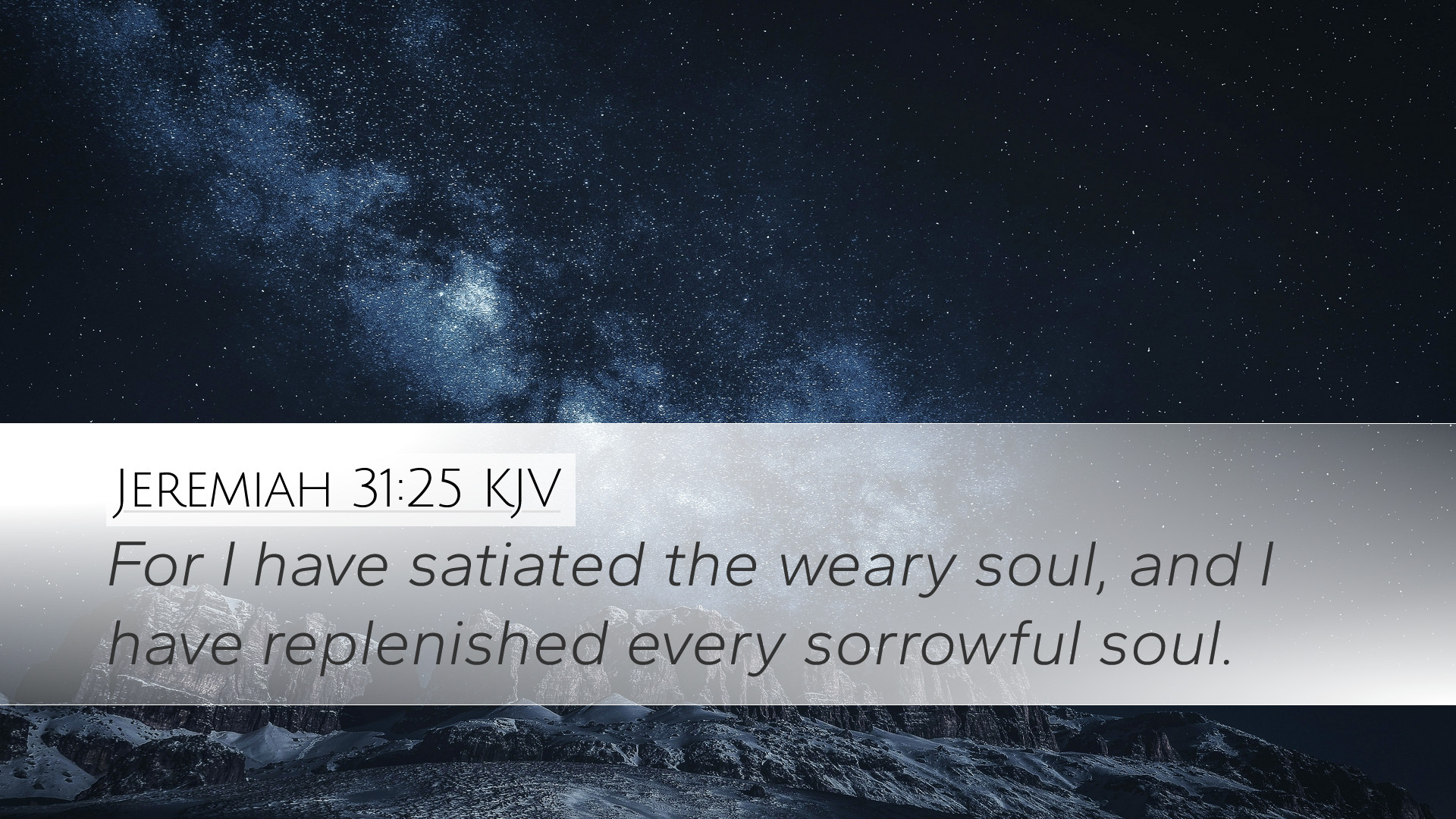Commentary on Jeremiah 31:25
Text of Jeremiah 31:25 (KJV): "For I have satiated the weary soul, and I have replenished every sorrowful soul."
Overview
Jeremiah 31:25 is a profound proclamation of God's promise to restore and refresh His people. This verse appears in a context that emphasizes the future hope for Israel after a period of deep sorrow and distress. It highlights God's compassion and provision, aiming to comfort those who are weary and laden with burdens. The insights from various public domain commentaries enhance our understanding of this significant promise.
Insights from Matthew Henry
Matthew Henry emphasizes the pastoral heart of God revealed in this verse. He explains that the terms "weary soul" and "sorrowful soul" refer to those under affliction and sin. Henry notes:
- Divine Comfort: God’s promise indicates His active role in providing comfort to those in distress. He “satiates” the weary, which illustrates divine satisfaction and rest offered to the afflicted.
- Restoration and Refreshment: The term “replenished” suggests a renewal of strength and vigor. This could relate to both spiritual and physical revivals among God’s people.
- Context of Hope: Henry highlights that Jeremiah speaks of a future where God will restore His people, showcasing His faithfulness. The promise is particularly aimed at the remnant who will return from exile, emphasizing spiritual restoration.
Insights from Albert Barnes
Albert Barnes offers an analytical approach to the text, noting the theological implications of God’s promise:
- God's Providence: Barnes contemplates the goodness of God in providing for the needs of the weary. He emphasizes that this sustenance is not merely physical but extends into emotional and spiritual realms.
- Universal Application: The statement that God satiates every "sorrowful soul" indicates the breadth of His mercy. It is not limited to a select few, but available to all who turn to Him in their state of sorrow.
- A Call to Awareness: Barnes notes that this verse serves as a reminder that in times of distress, believers should seek God, who is willing and able to provide peace and restoration.
Insights from Adam Clarke
Adam Clarke provides a detailed examination of the terms used in the passage, enriching our understanding:
- Linguistic Analysis: Clarke focuses on the Hebrew words 'satiated' and 'replenished.' He suggests the Hebrew might imply a nourishing and fulfilling experience for those who are spiritually thirsty.
- Contextual Significance: He notes that Jeremiah’s audience was facing exile and despair, making this promise of restoration particularly impactful. It speaks to God’s unwavering commitment to His covenant people.
- Applications for Today: Clarke finds parallels in modern experiences of despair, ensuring that believers today can claim this promise. He challenges readers to seek out God’s replenishment in times of personal struggle.
Theological Implications
This verse delivers profound theological insights that are crucial for understanding the nature of God:
- God as Comforter: The depiction of God satisfying the weary and sorrowful emphasizes His role not just as a judge but as a source of comfort and restoration, affirming His loving kindness.
- Restoration Theme: This aligns with the broader narrative of scripture that consistently illustrates God’s desire to restore humanity. From the fall of man to the redemption offered in Christ, this theme is steadfast.
- Hope for the Future: The promise contained within this verse looks forward to the new covenant, which culminates in the work of Christ, further deepening its significance for both the Old and New Testament contexts.
Application for Pastors and Theologians
Jeremiah 31:25 serves as an important text for pastoral ministry and theological reflection:
- Pastoral Care: Pastors can derive a model of care from this verse, as it shows the heart of God for the afflicted. They are called to embody the same comfort that God offers.
- Encouragement in Teaching: Theologically sound teaching can be built upon the concept of God as a replenishing force, helping congregations understand their identity in Christ as those who can receive divine nourishment.
- Spiritual Discipleship: This passage encourages a discipleship that acknowledges human weariness and sorrow while actively seeking God’s refreshing presence.
Conclusion
Jeremiah 31:25 is a powerful reminder of God’s enduring promise to satisfy the weary and sorrowful. Through careful engagement with the insights of Matthew Henry, Albert Barnes, and Adam Clarke, one can deeply appreciate the richness of its promise. As we reflect on this verse, we recognize that it invites us all into a transformative relationship with God—a relationship characterized by comfort, restoration, and hope for the future.


